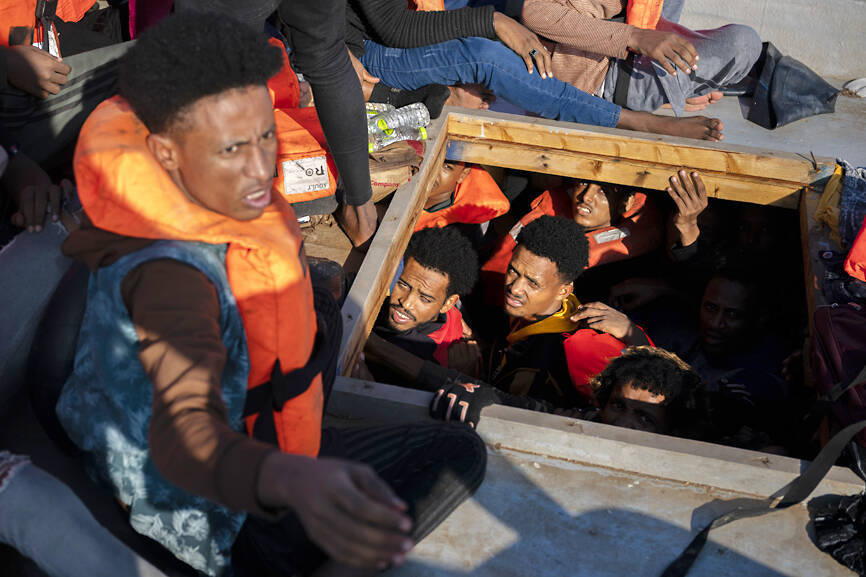A boat carrying dozens of migrants trying to reach Europe on Saturday capsized off the coast of Libya, leaving more than 60 people dead, including women and children, the International Organization for Migration (IOM) said.
The shipwreck was the latest tragedy in this part of the Mediterranean Sea, a key, but dangerous, route for migrants seeking a better life in Europe.
Thousands have died, officials said.

Photo: AP
The UN migration agency said in a statement, citing survivors, that the boat was carrying 86 migrants when strong waves swamped it off the town of Zuwara on Libya’s western coast and that 61 migrants drowned.
“The central Mediterranean continues to be one of the world’s most dangerous migration routes,” the agency wrote on X, formerly Twitter.
Libya has in the past few years emerged as the dominant transit point for migrants fleeing war and poverty in Africa and the Middle East, even though the North African nation has plunged into chaos following a NATO-backed uprising that toppled and killed longtime Libyan leader Muammar Qaddafi in 2011.
More than 2,250 people died on the central European route this year, IOM spokesman Flavio Di Giacomo said.
It’s “a dramatic figure which demonstrates that unfortunately not enough is being done to save lives at sea,” Di Giacomo wrote on X.
The IOM’s missing migrants project said that at least 940 migrants were reported dead and 1,248 missing off Libya between Jan. 1 and Nov. 18.
About 14,900 migrants, including more than 1,000 women and more than 530 children, were intercepted and returned to Libya this year, said the project, which tracks migration movements.
Last year, the project reported 529 dead and 848 missing off Libya. More than 24,600 were intercepted and returned to Libya.
Human traffickers in the past few years have benefited from the chaos in Libya, smuggling in migrants across the country’s lengthy borders, which it shares with six nations. The migrants are crowded onto ill-equipped vessels, including rubber boats, and set off on risky sea voyages.

ANGER: A video shared online showed residents in a neighborhood confronting the national security minister, attempting to drag her toward floodwaters Argentina’s port city of Bahia Blanca has been “destroyed” after being pummeled by a year’s worth of rain in a matter of hours, killing 13 and driving hundreds from their homes, authorities said on Saturday. Two young girls — reportedly aged four and one — were missing after possibly being swept away by floodwaters in the wake of Friday’s storm. The deluge left hospital rooms underwater, turned neighborhoods into islands and cut electricity to swaths of the city. Argentine Minister of National Security Patricia Bullrich said Bahia Blanca was “destroyed.” The death toll rose to 13 on Saturday, up from 10 on Friday, authorities

DEBT BREAK: Friedrich Merz has vowed to do ‘whatever it takes’ to free up more money for defense and infrastructure at a time of growing geopolitical uncertainty Germany’s likely next leader Friedrich Merz was set yesterday to defend his unprecedented plans to massively ramp up defense and infrastructure spending in the Bundestag as lawmakers begin debating the proposals. Merz unveiled the plans last week, vowing his center-right Christian Democratic Union (CDU)/Christian Social Union (CSU) bloc and the center-left Social Democratic Party (SPD) — in talks to form a coalition after last month’s elections — would quickly push them through before the end of the current legislature. Fraying Europe-US ties under US President Donald Trump have fueled calls for Germany, long dependent on the US security umbrella, to quickly

Local officials from Russia’s ruling party have caused controversy by presenting mothers of soldiers killed in Ukraine with gifts of meat grinders, an appliance widely used to describe Russia’s brutal tactics on the front line. The United Russia party in the northern Murmansk region posted photographs on social media showing officials smiling as they visited bereaved mothers with gifts of flowers and boxed meat grinders for International Women’s Day on Saturday, which is widely celebrated in Russia. The post included a message thanking the “dear moms” for their “strength of spirit and the love you put into bringing up your sons.” It

In front of a secluded temple in southwestern China, Duan Ruru skillfully executes a series of chops and strikes, practicing kung fu techniques she has spent a decade mastering. Chinese martial arts have long been considered a male-dominated sphere, but a cohort of Generation Z women like Duan is challenging that assumption and generating publicity for their particular school of kung fu. “Since I was little, I’ve had a love for martial arts... I thought that girls learning martial arts was super swaggy,” Duan, 23, said. The ancient Emei school where she trains in the mountains of China’s Sichuan Province